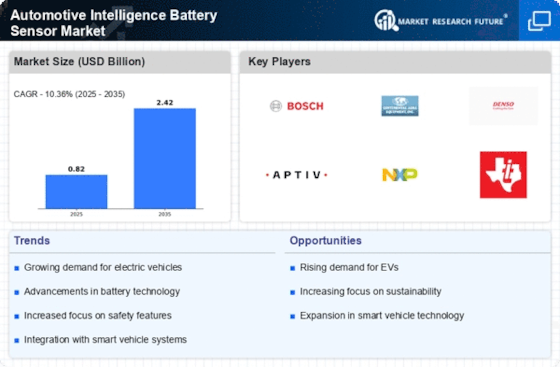Market Share
Automotive Intelligence Battery Sensor Market Share Analysis
The Automotive Intelligence Battery Sensor market is driven by several factors among them technological advancements, regulatory frameworks, consumer preferences, and industry partnerships. While offering tremendous opportunities through the growth of EVs, ADAS systems and strict regulations; the market faces its own share of difficulties around cost, technology adaptation and supply chain breaks. Therefore, manufacturers have continuously innovated low-cost and high-quality AIBS that can be used in future automobiles making this a reality for automotive technology and sustainability.
Another important AIBS market trend is the fact that modern battery management systems (BMS) continue to be better than their predecessors. With BMS, which AIBS happens to be a part of, it has become possible for more accurate information regarding different issues such as voltage, temperature and current consumption to be obtained. This increased level of accuracy helps in managing battery life resulting in the extended functionality of batteries and enhanced energy efficiency in electric vehicles. The development supports the industry’s effort towards advancing battery technology and achieving efficient and dependable operations of electric cars.
Similarly, advancements in self-driving vehicles are shaping up the AIBS market. Being autonomous machines, self-driven cars necessitate improved sensor technologies to bolster security and reliability of electrical system including batteries. Notably, AIBS significantly contributes through real-time updates on battery status that facilitate optimization of power consumption by driverless automobiles for better overall performance.
Besides this, there is an increasing adoption of connected vehicle technology which is causing disruption within the AIBS market. Indeed when fitted into a connected car ecosystem; AIBS enhances data connectivity to cloud based platforms on real time basis. Such a connectivity enables remote health monitoring capability for batteries as well as predictive maintenance or upgrades that can enhance the system features of AIBS via over-the-air updates.This way there is merging of a more extensive vehicle concept with more discrete battery management element since smart mobility solutions have become so popular with consumers.
Cost reduction and improved energy efficiency represent crucial trends in the AIBS market. To make EVs affordable auto manufacturers are trying create cost-effective AIBS solutions without any loss in their quality.This shift has necessitated new sensor technologies, manufacturing techniques and materials aimed at maintaining affordability while delivering high-performance standards.
Government regulations and environmental concerns are playing a pivotal role in shaping trends within the AIBS market.Stringent emissions standards and regulations promoting cleaner transportation are incentivizing automakers to invest in electric and hybrid vehicles. As a result, the AIBS market is experiencing increased demand for these critical vehicle technologies as manufacturers aim to satisfy existing regulations and respond to consumer preferences for greener and safer transport.
However, there are challenges such as data security concerns, standardisation of AIBS technologies, and a reliable charging infrastructure for e-vehicles that need to be considered by the AIBS market. These issues can only be addressed when there is collaboration on an industry level; advancement in the technology and regulatory frameworks that will ensure proper integration and wider use of these techniques. The Automotive Intelligence Battery Sensor market is undergoing transformative trends driven by the broader shifts in the automotive industry towards electrification, connectivity, autonomy, and sustainability. In line with this rapid adoption of electric powered cars hybrid cars around us has been significantly facilitated by stringent government policies aimed at reducing environmental pollution caused by fuel emissions.

















Leave a Comment